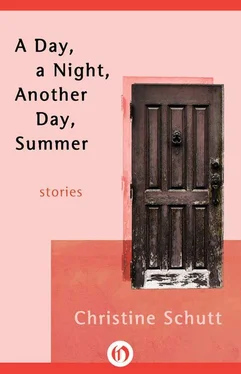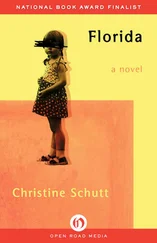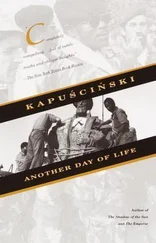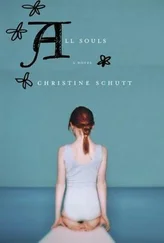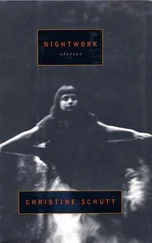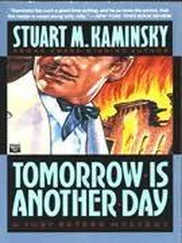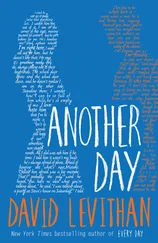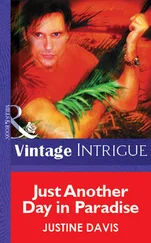Out here the land is vacant. The fields look sad.
We should have a fire and sit close, knee to knee, feet to the flames — let the heat muddle us! We should get warm enough to wander. Netta's house is very large and unlived in without kids. Netta says she loves having us live here. “You have no idea,” she says, “how much.” We roam and look into and open; we make the house ours and use different tubs, strike fires in comfortable rooms, because Frannie can use matches. She lights the library fire and we sit with Hattie’s cookies in our laps, eating, lazing, reading until we leave the stupefying fire to lean against the windows in the sunroom with the parrots. How cool it is, but what is that we smell? What is Hattie making?
Hattie says, “Now you’re in the kitchen, do you want to help?”
We stand beating and beating the frosting, which catches on our arms, so we lick at ourselves until the frosting peaks and we can make a road down the middle. We’re done! Done and dumbed with sugar and listening— shhhhh.
The plow makes cow noises as it lumbers up the hill, and somewhere men in clouds of snow are tossing sand and shoveling. Mr. Rassmusen, we hope, stays in; such strenuous work could kill him — his heart. His heart and his back! Hattie hopes the man is smart enough to make P.J. do it. P.J. is young. P.J. is not much older than we are; but he smells like a man to us, earthy and unsafe. Unshaved, unwashed, uncouth. Uncouth? Frannie’s word. She can be a show-off, Frannie can. She can smarm her way into something sweet. Hattie simply forgets what time it is — almost dinner! — and she tells us stories. The day P.J. and his older brothers went shirtless near the forage blower and came out bloodied with their own blood or something else’s. Hattie’s stories. The sick-making smell of skunk and the mutt’s whining home from it. Who dared go near him? Even when he smelled of himself or of the marshy water he swam in, that mutt was not a dog to get close to. The rats in her barn sleeked through the silage, fearless. Hattie’s stories. Cows and horses, litters of kittens found egged in strawed places, this was how she lived. She left out sadness.
The coarse stink of onion grass and her rushed and dingy hairdo. Hattie in the sleeveless dress she wears to cook in — housecoat cotton, no matter the cold — Hattie is here when she is not here. Hattie’s slippers and sleeveless dress she keeps in the backstairs bathroom. We have to hold our breath the whole time in there — hurry!
This happened in the middle of summer in the middle of another play of Frannie’s devising. My part was small, but it called for me to swing the hammock until Frannie fell out. Of course, she fell too hard; but it was not, Netta assured me, my fault.
Hattie said, “It’s both yews’ fault.”
I hated Hattie then.
Frannie had her cast signed so many times it looked like her yearbook page. Silly flowers and hearts in colored pens, accounts of love, old secrets. She wrapped her arm in plastic and held it in the air when she swam; she screamed if she thought I had splashed her. “Get a towel!” She was fearful the ink might run and the precious cast crumble.
(Mother used a hanger and scratched her own back bloody; I saw.)
Someone’s coming; headlights rove over the snow, and Hattie hopes it is not who she thinks it is, but his headlights show in the falling. The rest is darkness.
(They say our mother is happier where she is.)
What did Hattie know then that we did not?
(Mother had her secrets; she had more than most.)
The passenger door was ledged with snow that sighed over Hattie when she closed it.
My dream began that all was blackness and terrible stars, yet they could see where they were going, and the roads, too, I thought, were cleared. They drove in heat and quiet, and Hattie took her scarf off and smoothed what she wore for hair. There wasn’t much.
“Lick,” Hattie saying. “Lick the spoon.”
That smell I brushed against waiting at her waist for her lap.
Come back!
UNREDISCOVERD, UNRENAMEABLE
BEFORE THIS, THE ISLAND’S outreachings — vetch, creeper, bittersweet — the podded and nodding, all was bedlike August and inviting us to sleep. But we didn’t sleep; we wanted to be self-sufficient and secure and scouted the island to stockpile whatever could be eaten, burned. Mother boiled rose hips and sweetened grains with berries popped between her fingers — her slender fingers and their used, bruised stains! Our mother, of course, knew how to feed us; she knew which leaves to crush and hold against our noses. Lemongrass, mint, lavender, thyme. With such scents as these our mother soothed us, and at night she told the stories with the cautions at the end: “That’s how accidents happen.”
My sisters wanted to be the stories, central and adored, but I was of an age that wanted stories about Father as I was now, a boy whose swollen sex woke him with alarm, and then the delight in its easing.
I wanted the story of Father’s looking on, spellbound — his word — by the simmering Oma stitching up her lip with only whiskey to numb the work. Not that Oma drank much. Not even her lip, split enough for stitches, could make her drink. Nothing that happened to our father’s mother’s mother — not the lip, not the fire, not the loss of her Dora — could raw our Oma to tears.
Was I so brave as that? I didn’t ask.
Our father’s mother’s mother was brave, and our father was brave, too. He was the one who cut down the suicide, that possum-ugly, mud-dark, urinous man. “Tell us again,” but in the stories Mother repeated, our father came out married. He came out worn and running away, leaving Mother with the next bad job.
“Is that a true story?” we asked, unbelieving.
The island life was good then, but not so good as we would stay here.
Here, the ocean and its drama, an island cliffed and beaten by ferocious waves on one side and at the other flat and lapped. “Water, water everywhere and not a one of us can swim!” Our mother’s song for us when Father took us to the pond. The pond, in the center of the island, was where we learned to swim, holding to the soft bank and kicking such a froth until the bridge of my nose burned from snorting water and it seemed I was water, blinded and blued with water, my face all snot and spit. “Let go!” Father said, and he kicked me loose, and I sank. This happened over and over again while Mother stood by singing.
Our mother says the mornings now are hardest and that I should know how many nights she cannot sleep unless she braces her body between the bodies of my sisters.
But I was speaking of before, before the rain washed out our start, our father, and the very boat that brought us; before the rain, the island was dewed and bejeweled with water caught in plattered leaves we drank from as from glasses. Deer, which must have clicked across the ice one winter, bounded past us, and there was smaller wildlife — fox, raccoon, rabbit, squirrel — and birds of northeastern, fall-serious colors. Mussels, periwinkles, dust-scuttling crabs, and bark-colored fish, the shallow water could be farmed, and we gathered what the high tide left behind. We gathered low-bush berries and mosses we could eat. This was our beginning, when the insistent squaw of seagulls crashing after urchins, susurrant grasses, and groggy frogs, the thin pitch, high pierce of insects was our music on any clear morning. The trees swept through the afternoon until stilled by the sun, they held themselves erect as candles, and the island flamed, and Father told my sisters, “Wish!” and they did, I think; I saw their mouths move. The island was in such ways silencing. The nights, guttering in kerosene, were starry and long — and the cold, the cold! Often I was witness to my mother when she held out her hands and said, “Look at how cracked,” when she said, “No matter how beautiful it is here, I am lonely.”
Читать дальше
